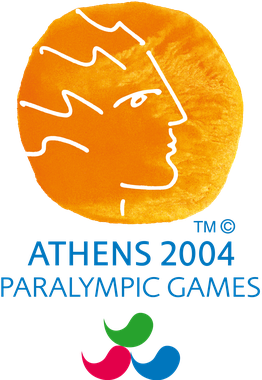
The 1972 Summer Olympics, officially known as the Games of the XX Olympiad and officially branded as Munich 1972, were an international multi-sport event held in Munich, West Germany, from 26 August to 11 September 1972. It was the second Summer Olympics to be held in Germany, after the 1936 Games in Berlin, which had taken place under the Nazi rule. Germany became only the second country at that point after the United States to have two different cities host the Summer Olympics.

The 2004 Summer Paralympics, the 12th Summer Paralympic Games, were a major international multi-sport event for athletes with disabilities governed by the International Paralympic Committee, held in Athens, Greece from 17 to 28 September 2004. 3,808 athletes from 136 countries participated. During these games 304 World Records were broken with 448 Paralympic Games Records being broken across 19 different sports. 8,863 volunteers worked along the Organizing Committee.

Final results for the Judo events at the 2000 Summer Olympics:

This page shows the final results of the Judo competition at the 1996 Summer Olympics in Atlanta.

The judo competition at the 1964 Summer Olympics was the first time the sport was included in the Summer Olympic Games. As a result, decades of judo being officially banned as an "imperialist sport" in the Soviet Union ended shortly before the Games started, as Soviet authorities prioritized winning medals over anything else. The medals were awarded in 4 classes, and competition was restricted to men only. The competition was held in the Nippon Budokan, which was built to host the competition.
At the judo competition at the 1976 Summer Olympics, medals were awarded in five weight classes and in the open competition, and was restricted to male judoka only.

The Judo competition at the 1984 Summer Olympics continued the seven weight classes first used at the 1980 Games. With the open division, there were eight competitions. Powerhouse Japan returned to the top of the medal count after eight years, having boycotted the Moscow games. Because of the Soviet-led boycott of the Los Angeles games, several traditionally strong judo countries, including Cuba and the Soviet Union, did not participate. The Judo competition was held at California State University, Los Angeles.

The Judo competition at the 1988 Summer Olympics continued the seven weight classes first used at the 1980 Games. The open division was eliminated from the competition. Women's judo made its first appearance at the Olympic Games, as a demonstration sport. Japan failed to claim the top of the medal count for the first time in an Olympics in which they participated, coming in third behind South Korea and Poland.

The Judo competition at the 1992 Summer Olympics was contested in fourteen weight classes, seven each for men and women. The seven men's weight classes continued to be those first used in 1980. This was the first Olympic competition to award medals to women judoka; women competed in 1988 when women's judo was a demonstration sport.

The 2009 Summer Universiade, officially known as the XXV Summer Universiade, was celebrated in Belgrade, Serbia from July 1 to 12, 2009. The event has also been organised by a range of co-host cities mostly in Vojvodina, close to Belgrade. It was the largest sporting event ever to be organised by the city. At this Universiade the biggest star was the Russian rhythmic gymnast Evgeniya Kanaeva, who won 5 gold medals. Russia was the leading nation in the medal table, with the most gold medals (27) and most medals (76).
The weightlifting competition at the 1968 Summer Olympics in Mexico City consisted of seven weight classes, all for men only. The competition was held from 17 to 21 October 1968 at the Teatro de los Insurgentes.

Mongolia first participated at the Olympic Games in 1964, and has sent athletes to compete in all but one Summer Olympic Games since then, being part of the boycott of the 1984 Summer Olympics led by the Soviet Union. Mongolia has also participated in the Winter Olympic Games since 1964, missing only the 1976 Winter Games.

Kim Jae-bum (김재범) is a retired South Korean judoka. Despite being plagued with injuries throughout his career, Kim is known for dominating major competitions at the half-middleweight category (81 kg)—particularly between his Olympic debut in 2008 and his 2012 Olympic finals rematch against Ole Bischof.
The Para Judo competition of the 2008 Summer Paralympics was held in Beijing Workers' Gymnasium from September 7 to September 9. There were 13 events, corresponding to seven weight classes for men and six for women. At the Paralympics, judo is contested by visually impaired athletes.

The Para Judo competition of the 2012 Summer Paralympics was held in ExCeL London from 30 August to 1 September. There were 13 events, corresponded to seven weight classes for men and six for women. At the Paralympics, judo was contested by visually impaired athletes.

Judo at the 2016 Summer Olympics in Rio de Janeiro took place from 6 to 12 August at the Carioca Arena 2 inside the Barra Olympic Park in Barra da Tijuca. Around 386 judoka competed in 14 events.

Wrestling at the 2016 Summer Olympics in Rio de Janeiro took place from 14 to 21 August at the Carioca Arena 2 in Barra da Tijuca. Wrestling had been split into two disciplines, freestyle and Greco-Roman, which were further divided into different weight categories. Men competed in both disciplines whereas women only participated in the freestyle events, with 18 gold medals awarded. Wrestling had been contested at every modern Summer Olympic Games, except Paris 1900.

Judo was a sport at the 2020 Summer Olympics in Tokyo, and featured around 393 judoka competing in 15 events, seven each for both men and women as well as a new mixed team event. The 2020 Summer Olympics were postponed due to the COVID-19 pandemic, and the judo competitions were held in July 2021 at Nippon Budokan.

Saeid Mollaei is an Iranian-born Mongolian half-middleweight judoka. He was born in Tehran to ethnic Azerbaijani parents originally from Khoy. Iranian authorities ordered Mollaei to lose intentionally in the semi-final at the Tokyo 2019 World Championships, so as to avoid a potential match in the finals against Israeli 2019 world champion Sagi Muki. In August 2019, he moved to Europe with a two-year visa from Germany, saying he was afraid to return to Iran after exposing and criticizing its pressure on him to deliberately lose in the World Championships. In December 2019, he became a citizen of Mongolia. He dedicated his 2020 Olympic medal to Mongolia, to the Mongol people, and to Israel. From May 2022 on, Mollaei represents Azerbaijan.
The mixed team competition in judo at the 2020 Summer Olympics in Tokyo was held on 31 July 2021 at the Nippon Budokan.













